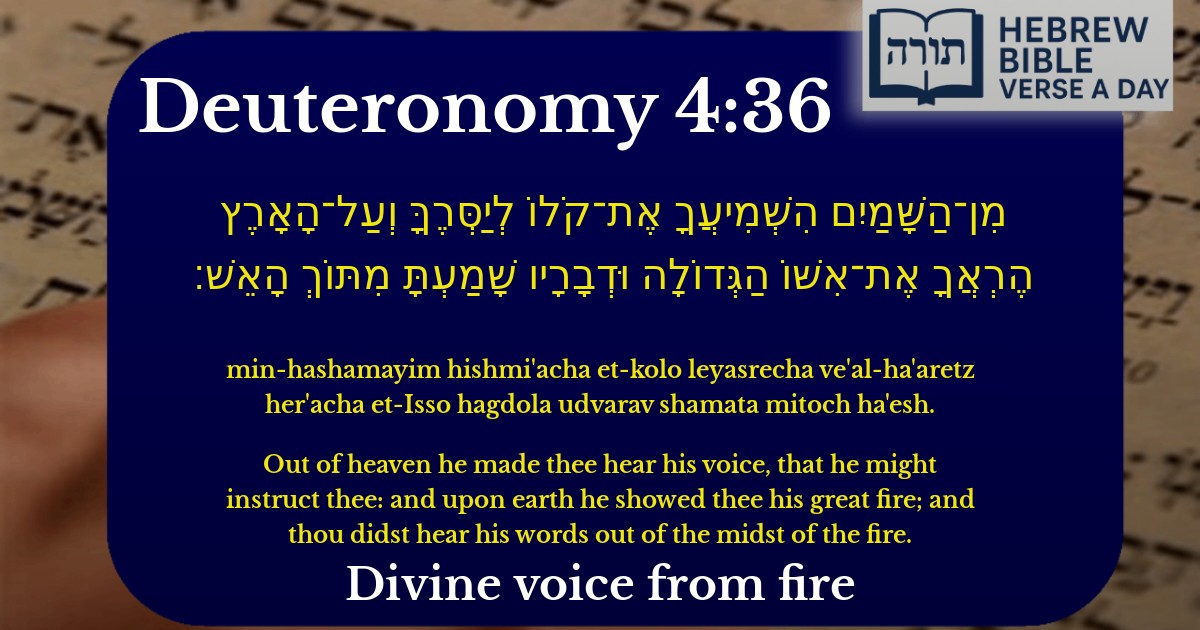Join Our Newsletter To Be Informed When New Videos Are Posted
Join the thousands of fellow Studends who rely on our videos to learn how to read the bible in Hebrew for free!
Hebrew Text
מִן־הַשָּׁמַיִם הִשְׁמִיעֲךָ אֶת־קֹלוֹ לְיַסְּרֶךָּ וְעַל־הָאָרֶץ הֶרְאֲךָ אֶת־אִשּׁוֹ הַגְּדוֹלָה וּדְבָרָיו שָׁמַעְתָּ מִתּוֹךְ הָאֵשׁ׃
English Translation
Out of heaven he made thee hear his voice, that he might instruct thee: and upon earth he showed thee his great fire; and thou didst hear his words out of the midst of the fire.
Transliteration
Min-hashamayim hishmi'acha et-kolo leyasrecha ve'al-ha'aretz her'acha et-Isso hagdola udvarav shamata mitoch ha'esh.
Hebrew Leining Text
מִן־הַשָּׁמַ֛יִם הִשְׁמִֽיעֲךָ֥ אֶת־קֹל֖וֹ לְיַסְּרֶ֑ךָּ וְעַל־הָאָ֗רֶץ הֶרְאֲךָ֙ אֶת־אִשּׁ֣וֹ הַגְּדוֹלָ֔ה וּדְבָרָ֥יו שָׁמַ֖עְתָּ מִתּ֥וֹךְ הָאֵֽשׁ׃
Parasha Commentary
📚 Talmud Citations
This verse is quoted in the Talmud.
📖 Berakhot 22a
The verse is referenced in a discussion about the divine revelation at Mount Sinai and its implications for Jewish law and practice.
📖 Megillah 31a
The verse is cited in the context of the public reading of the Torah, emphasizing the importance of hearing God's words as given at Sinai.


Context of the Verse
The verse (Devarim 4:36) appears in Moshe's speech to Bnei Yisrael, recounting the revelation at Har Sinai. It emphasizes the unique nature of Matan Torah—where Hashem's voice was heard from heaven, accompanied by awe-inspiring manifestations on earth, including fire.
Rashi's Explanation
Rashi (Devarim 4:36) explains that the phrase "מִן־הַשָּׁמַיִם הִשְׁמִיעֲךָ אֶת־קֹלוֹ" ("Out of heaven He made you hear His voice") refers to the Aseret HaDibrot being spoken directly by Hashem, not through an intermediary. This underscores the unparalleled intimacy of the revelation. The "great fire" ("אִשּׁוֹ הַגְּדוֹלָה") symbolizes the divine presence, as fire represents both purification and awe (see Shemot 19:18).
Rambam on Divine Revelation
In Moreh Nevuchim (2:33), Rambam discusses how Har Sinai’s revelation was a singular event where the entire nation experienced prophecy collectively. The fire and heavenly voice were tangible proofs of Hashem’s direct communication, reinforcing the authenticity of Torah.
Midrashic Insights
Theological Significance
The verse highlights two dimensions of Matan Torah: the transcendent ("from heaven") and the immanent ("upon earth"). This duality teaches that Torah bridges the divine and human realms, requiring both spiritual commitment and practical application in daily life (see Devarim 30:12).
Halachic Implications
The Sefer HaChinuch (Mitzvah 416) derives from this verse the obligation to remember Har Sinai, as it is the foundation of our belief in Torah MiSinai. The sensory experience of fire and voice ensures that the event remains an incontrovertible testimony for future generations.